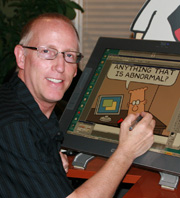Dilbert's 2009 Forecast
JANUARY 3, 2009

- Scott Adams, creator of Dilbert
- (Scott Adams)
- Enlarge This Image
Web Resources
Related Stories
It's a tough economy. Even cartoon characters are losing their jobs. Dilbert, a character who's spent 20 years chronicling the daily frustrations, humiliations, shenanigans and incompetence of the American workplace, will get his pink slip. Fittingly, Wally, his cynical and lazy co-worker, will stay on. John Moe talks with Dilbert's creator, Scott Adams about finding the humor we crave when the economy sinks and life gets absurd. Adam's latest book is Dilbert 2.0: 20 Years of Dilbert.
---
John Moe: Hello, Scott.
Scott Adams: Hello. Thanks for having me.
John: Thanks for being here. Do you have any New Year's resolutions for 2009?
Scott: [Sighs] I try not to have any New Year's resolutions, but this year is a little different. This year is my first time talking on the radio in probably three and a half years just because I had a bizarre neurological condition that prevented me from even speaking for most of that time.
I recently had an operation that fixed it against all odds. My goal had been that I would get my voice back to normal but then also get it to a perfect state. So somewhere between the mumbling and the nasal sound you hear now, in the next several months I'd like to get a better voice.
John: I think you sound great.
Scott: Thanks.
John: Are comic strips Cassandra's? Are comic strips able to foretell the future and bad times to come? Did Dilbert call this all along, Scott?
Scott: Well, I think Garfield does that. He's foretelling the future of cats that walk upright and steal your lasagna, but...
John: And complain about Mondays even though they don't have jobs.
Scott: Yeah, but Dilbert is more of a snapshot of the present.
John: Ah!
Scott: So as things get bad in the real world, things get worse for Dilbert so they're going to get real bad in a few weeks here for Dilbert.
John: How bad are they going to get?
Scott: He will lose his job.
John: Really?
Scott: He will be jobless, yes.
John: [sighs] How do you go about reacting to the news of the day? Is it by feel or is it a very considered way of commenting on what's happening in the workplace?
Scott: Well, first of all, I work a month or two ahead so I have to guess what's still going to be a problem in a month or two. I think I'm safe saying that the economy isn't going to turn around anytime too quickly. I feel pretty confident about that. Otherwise, I just get email from people and they say, "This is what's bugging me" and I turn it into a comic.
John: What's funny about what's going on right now?
Scott: Well, let me give you a little description of the way I see it. In order for the economy to improve right now, you would need the government to do two things. You would first need them to understand what they need to do, and, secondly, execute it properly. The only things you know that can't happen in the future is the government won't know what to do and if they did, they won't execute it properly.
But, there's still hope, because they might get the wrong solution of what they should do but then execute it improperly and accidentally hit the right solution. So absurdity abounds and that's good for my business.
John: Is bad business good for the Dilbert business? Does interest in Dilbert go up in times like these?
Scott: Yeah. Yeah, I've been watching my Web hit and how many people reprint my comics on blogs and it just spiked in the last month or two. So I'm a little like an undertaker. When things are bad for everybody else, I'm embarrassed about it and I can't say I'm happy about it but, things certainly pick up on my end of things.
John: You're recession-proof. More Dilbert strips get snipped out and pinned to cubicle walls during times like these, I imagine.
Scott: More of them are pinned to blogs now. That's what I track right now.
John: Your new book, "Dilbert 2.0" compiles 20 years of Dilbert. What struck you most about the way Dilbert has evolved given that he is a representative figure of all of us in our day to day work struggles?
Scott: It was actually kind of interesting to watch how the trends went during the 20 years. Dilbert was born when there was a lot of down sizing; the economy was kind of limping along. He was hugely popular because he was kind of the poster boy for down sizing.
But, when he hit the "Dot-com" Era, I literally couldn't find anybody to complain about their job for a few years. It was tough to write the script because everybody thought, "Well, if I'm not already a billionaire, it's probably my own fault. I should go out and start my own dot-com company. How hard could it be?"
Now watching the pendulum swing back, it's kind of interesting to see the whole context there.
-
- Music Bridge:
- Rot
- Artist: Don Shtone
- CD: Beware of the Cat (Off/Still)







Comments
Comment | Refresh
Post a Comment: Please be civil, brief and relevant.
Email addresses are never displayed, but they are required to confirm your comments. All comments are moderated. Weekend America reserves the right to edit any comments on this site and to read them on the air if they are extra-interesting. Please read the Comment Guidelines before posting.
You must be 13 or over to submit information to American Public Media. The information entered into this form will not be used to send unsolicited email and will not be sold to a third party. For more information see Terms and Conditions and Privacy Policy.